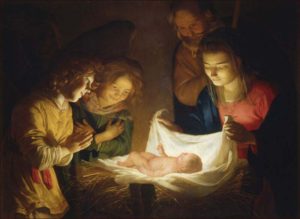Joe Pursch
My New Testament Notebook (John 1:1-18 The Incarnation)
My English Text Notes on John 1:1-18, Written in Preparation for Preaching my Series Entitled Christmas Everlasting :
The first 18 verses of this first chapter are all about Revelation. Communication. Illumination. Even the title given to Jesus, Word, expresses the theme. It also expresses the role that Jesus filled in his appearing: he expressed, communicated, illuminated the person of God, the invisible.
Another theme is beholding. The idea of light shining, is prevalent throughout, as is the idea of the witness, that compels belief or rejection. Another key word is light. There is also the theme of rejecting and receiving.
In verse 14, the great theme is specified and tightened with the idea that this Word, this expression of God… became flesh. He not only became flesh, but he dwelt among us, implying a long period of time. It also implies relationship, fellowship, involvement, immersion, community, sameness. The astounding idea that the eternal visitor would come from the glories of heaven and dwell among people like us in a world like ours is evident in the text. He, the Glorious One, left glory to come to this world and to dwell among us in our humiliation, and the text says that we as a result have seen his glory. John’s mind was going back to the Transfiguration moment, what he may have more fully realized that he was in the presence of
God veiled all along. John made no equivocation about the fact that the glory that he saw on the mountaintop that day had to be the glory of the only Son of God given to him from the only Father. It was a visible glory in that account, but somehow John says it was also a glory that was full of grace and truth. I’m not sure what this all means.
Right after our verse is the curious construction of verse 15, which appears to be in parentheses. I don’t know why this is. This verse seems to amplify the terminology of the Word, emphasizing his deity and the eternal distance that he covered getting to us. John the Baptist being quoted by John the Apostle demonstrates that even though Jesus was chronologically younger than he was by birthdate, in reality, Jesus was far older, in fact eternally older than John. This proves his deity because of his eternal reality.
John goes on in his narrative after verse 14 to talk about how from his fullness we have all received, grace upon grace. I don’t know who the “all “is referring to; does it refer to all those that would come to believe, as John had,and in this the hope that his readers would?
And what is this fullness that we received from? Is it the literal glory, the shining presence of God? I don’t think so, because we’ve not received that from Him (yet). It must be the fullness of who he is in us, in which he pours out grace upon grace as needs arise, as our knowledge grows, and as our sanctification increases. In fact the mark of the Christian is that he demonstrates the presence of the grace of God, and the fullness of the personality and the knowledge of Christ in his life.
John brings another distinction about the arrival of this word in verse 17: he speaks about a change in dispensations, and that the law was given through Moses but grace and truth came through Jesus Christ. He seems to mark a different way of knowing God; the era of law under performance leading to failure and desperation to the era of grace powered by truth accomplished by the cross-work of Christ leading to a full and secure knowledge of God.
Verse 18 seems to finalize this long-running stanza from verse one about God revealing himself to the world through Christ. John seems to state that we were in an impossible state before the arrival of Jesus in the flesh, because no one has ever seen God. The only hope we would ever have of knowing God is if he took an action to help us know him, if he took the step of revelation, of a self-revelation, to us. This is exactly what he did through the arrival of his Son. God the Father sent God the Son from his own side to make who he is known enough to us that we might come to know him in salvation and eternity.
